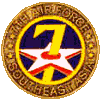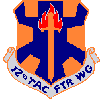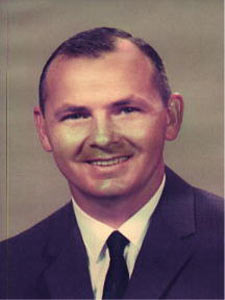|
18 Jan 2005
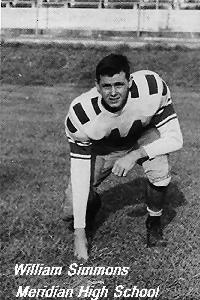
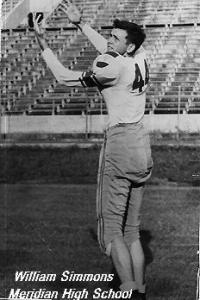
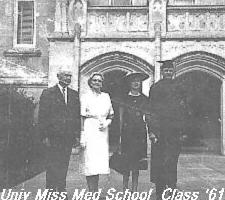
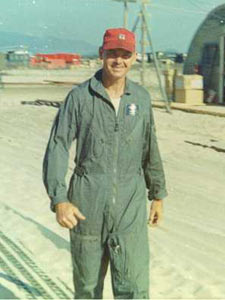
EMAIL CONTACT WITH
557TH PILOT AND FRIEND
JIM THORNTON
Dear Si,
I served at Cam Ranh Bay in the 557th from November 1965 to October 1966 and knew Bill well. A number of years ago I tried to find his family members through the River Rat Association, but did not have any luck. I was living in Jackson, MS at the time and even went to the Medical School in hope they could give me his hometown address. While I can't remember the town now, I did call to see if his family still lived there, to no avail. I had run across several pictures of Doc and thought his family would enjoy having them. I also have a few stories to share that I think they would like hearing.
I hope you have been contacted by the pilots of the 557th before now, as all of us loved Doc and were crushed when he was lost. He was the only Doctor at CRB to live in the pilot's quarters! I happened across the 12TFW web site today and was excited to see your letter and address. Looking forward to your reply.
Jim Thornton
|
|
Jim - What a great surprise! I just forwarded your email to Bill's wife, Marilyn (Ms Bruce Roark) and to the kids, Bill, Bob & Lynn - they will be thrilled - as will Bill's extended closeknit family (Bill was 1 of 9), many of whom are on the internet (SIMFAM Net - 40+ members to date) and who cherish every bit of information that surfaces concerning Bill. (Note: Marilyn's husband is a neat guy and is very happy and comfortable with any and all discussion of Bill) ---
It's great that you found the 12thTFW website - I've met thru the site, a few folks that served with Bill and have been in contact with this great bunch of guys via "12TFW@Majordomo.net" forum for a long while - U gotta join the forum! - George A. Devorshak heads up the forum - Ron Doughty, Tom Pirtle and Bobby Sutton do the leg work - The forum has been a Godsend and through my passing along forum info concerning Bill and/or his cohorts to Bill's massive extended family via the net, it has served to keep the memory of Bill alive --
Besides George Devorshak and Tom Pirtle, you are the first I've met via the net who knew Bill personally and it's going to be great to get in touch - Bill ("William" to family) died doing what he truly loved doing and with folks he truly loved being with - from his last letters, I knew that he
was in "hog-heaven" and experiencing the "time" of his life - I personally appreciate the outstanding job you guys did (under politically micromanaged circumstances) especially in support of the "grunts" - you salvaged lots of lives --
I've constructed a memorial page in memory of Bill at
http://psysim.www7.50megs.com/html/wmdocsim.htm
I also have a DUSTOFF (my love) page at
http://psysim.www7.50megs.com/html/dustoff.htm
I'm looking forward to hearing from you and receiving pics of Bill - and yourself and other related ---
Excitedly,
Si --
|
|
Dear Simmons Family,
Wow! I was hoping for a response, but had no idea it would be this big. Marilyn, I may have met you at MacDill just before the squadron departed for Cam Ranh Bay, but I was only in the squadron for two weeks before we left. I started out flying for the Peoria, Illinois Air National Guard (same unit as George Devorshak) and then went to fly F-84's at MacDill in the summer of 1962. I was assigned to the 15th Wing. After volunteering to go to Vietnam in the fall of 1965, I suddenly found myself transferred to the 557th in the 12th just two weeks before departure. I attended one "going away" party, so that is where I may have met you.
Si, you were so right when you said that Bill died doing what he loved and doing it with those he loved. He was the only Doctor on the whole base to live with his pilots and we could not have been better cared for. After drinking warm water that smelled like the Army canvas bag it was stored in I caught Bill swishing his mouth out with tap water after brushing his teeth. When I challenged him on the indiscretion he just grinned and told me to keep on doing what he said and not what he did.
We lived in a large Quonset hut that was 20' wide and the rooms were located along the sides of the
building with a hallway down the center. Each room was about 16' long, 8' wide and housed four guys with the bunk beds on either end. Luck of the draw put Doc in the only room in the whole barracks with a former Bulldog, Claude Kincade, a big raw boned Mississippi farm boy. Claude could have played as a lineman for the Bulldogs, he was so big. Claude seldom drank and I only saw him overindulge once in the whole year. On that particular occasion he got a case of the whirlies after he got in bed and started to throw up in a 20mm ammo can he used for trash. The others in the room couldn't sleep with that going on, so Doc got his bag, loaded a syringe with a stomach remedy and then asked Claude to hold still so he could give him the shot. Claude drew himself up and announced that he would rather die than let an Ole Miss graduate touch him! We all laughed the next day, but I didn't appreciate it fully until I lived in Jackson. My wife, Peggy, got her law degree from Ole Miss, but we never got into the rivalry quite that much.
The whole wing was crushed when Cliff and Doc didn't return to base after their mission. We all said that they were waiting to signal us in the morning and all would be fine. I was on a mission leading two others the next day and upon returning to CRB the tower called and said a C-130 had picked up a beacon South of the base. I sent my wingmen in to land (low fuel) and then headed toward the area. My heart soared when we started to pick up an intermittent signal on Guard. I kept following the ADF and finally located the signal on top of a small mountain. I went in for a close look, didn't see anyone, then climbed and told CRB tower I had located the signal.
An Army chopper was sitting on the ramp, small one with the bubble nose, and the pilot went out to launch. Dean Cooke, one of our pilots, told the Army pilot that he would need him to recognize Cliff and Doc. The chopper pilot handed Dean two vests, one to sit on and the other to wear. They took off and headed to the hill and I had to leave just as they were getting there because I had fumes for gas. No other fighters had time to get down there, so they went in without support. As soon as they got over the beacon the VC opened fire and Cookie got a round through the floor, through the vest he was sitting on, and then through the bottom of his thigh.
A bunch of us met the chopper when it returned in hopes they had spotted Cliff and Doc only to find Cookie in unbearable pain. The medics finally managed to get him out of the chopper (he didn't want to bend the leg or let anyone touch him for that matter). It was certainly a different scene than I had seen John Wayne play many times before. Cookie talked his way out of the hospital in a week or so and almost bled to death on the medivac bird on the way home.
In short, we all loved Doc and would have done anything to get him back. I was the pilot member of the Board that tried to figure out what happened. I can tell you that nobody will ever be able to say for sure what happened or to rule out any possibility. The only time I ever got hit while flying combat at CRB was while sightseeing over a waterfall after a test hop.
Any time the VC heard an aircraft they pointed their weapons skyward and started shooting. I have seen thousands of guns flashes sparkling along a tree line while on a low level delivery. And the weather could be God awful and so dense you would have to fly just three or four feet from your leader's wing tip to see his wing light; all while bouncing in a thunderstorm. Dean Cooke had to bail out right over CRB once because the GCA didn't work when it rained real hard!!!
I will start an immediate search for the photos - we've moved since I last saw them, but don't despair. I am glad to finally "meet" y'all. Bill is both the fondest and saddest memory of that time in my life. I know I speak for all his charges in the 557th. I am sorry for your loss, but even more so for his Grandchildren. Wouldn't Bill have made a wonderful Grandfather? If you are ever wandering around Durango I would be crushed if you did not stop by, so we could show off our beautiful mountains and our old train. My ski pass has been renewed and I would love to take you skiing also.
With warm regards,
Jim
|
Originally published in the Meridian Star, Meridian, MS, in early October, 1966
CAPTAIN SIMMONS
'Once I Get Home'
By Edna Wilkinson
What force could compel a 33 year old devoted husband, father, son and brother, with a medical degree safely tucked away, and who for two years had been on the way to really living a dedicated life of service to his community, decided "this's just not for me?" We'll never know and can only surmise that "A man must do what he must do."
I refer to Dr. William P. Simmons, flight surgeon and chief of the Flight Medicine Section, 12th USA Hospital, Cam Ranh Bay, South Viet Nam, who died in the crash of his plane in the jungles of Viet Nam on September 3.
Letter to Brother
Perhaps some passages from a letter dated June 6, of this year from Captain Simmons to his younger brother, Capt. Armond Simmons, who was then a helicopter pilot with the 42nd Field Hospital will give us a clearer insight as to the flight surgeon's feelings. The letter reads in part:
"Dear Armond,
"I got your letter yesterday, and yes, I did get the first one too. I've been lazy about writing.
"I just finished my first six months over here and I guess you might say I'm over the hump, but I still have a helluva time to go. The town hasn't been bad at all, except for the separation from my family, which is really bad. I try to keep busy and keep my mind off going home - of course that's hard to do."
The letter goes on to describe the situation there at the time and then the Captain wrote:
"Sounds like the Army is about to put the screws on you. I don't regret the year here, but I never want to see VN again, and I'm sure you feel the same way. I'm all for the Air America Plan. That isn't bad living, especially when you can bring your family to Bangkok. I don't think Marilyn could survive another separation. She took it real well for about five months, but now she's beginning to weaken and I can understand.
"Congratulations on the VN Cross of Gallantry. I'll do my best to pick you up several of them and the stars."
Insists on Flying
"Most of the flying is in the F4. I had to stand down from flying strike missions for two months because 2nd Air Div. surgeon sent out a letter telling us not to fly. After two months of frustration I finally talked our wing commander into letting the flight surgeons fly anyway. So, we're back in the saddle again. Marilyn doesn't know I'm flying again, so don't mention it in the letters to home. No point in her worrying about it. I guess I'm just a fighter jock at heart. I've gotten spoiled on flying and get miserable when I can't fly. I only fly one or two missions a week. I have only 38 strike missions right now, but over 100 (total) combat missions.
"Most of our missions are against supply areas, trucks and roads. We occasionally get a good close air support mission, which is most interesting. I am not flying north of the 17th Parallel, so don't get a crack at a Mig.
"I have precarted for Germany and will probably get it. If I don't I'll probably go ahead and start a residency in one of the clinical specialties. Marilyn is hinting for me to get out, mainly because of the possibility of future separation, but I could never go back into general practice again. I think she'll see it my way once I get home.
"Both my boys will be playing baseball this summer, Bill in Little League, if he makes the team and Bob in Shirt League. I sure wish I could be there. They are little dolls. I miss my little gals too� Poor wives have to suffer sometimes. You really learn to appreciate them when you are away. If we go to Germany I may not see you for some time, unless you can swing a town in that direction. I wish you could.
"About time to close shop. Write again soon. Tell Lydia hello for me. Love, William."
These passages tell something of the wishes and desires of Dr. Simmons. There are two other letters written to Mrs. Simmons from the captain's friends after he was reported "missing in action." The first is from Major Bob Foster, Cam Ranh, Sept 12. They are exact quotes:
Letters From Friends
"Dear Marilyn, I would have written sooner, but I've waited, and hoped, and prayed. At first I was optimistic, but now things just don't look very good at all. We have searched, and given 'Doc' every opportunity to make contact with us and there has been nothing. We know the wreckage is within 15 miles of the base, however, the area is covered with jungle that is 150 feet thick. It will take time to locate it.
"I know how tragic the loss is. 'Doc' and I became so close here that I also feel as if I've lost a part of myself. Every man in the squadron feels the same, and I want to express the deepest sympathy from each of us.
"Doc thoroughly enjoyed his work here and distinguished himself almost to the point of becoming a legend in his time. Knowing and associating with him was one of the most pleasant experiences of my life. He was a devoted husband and father, and was anxiously awaiting the time when he would get all of you together again and to Europe.
"You will certainly be kept abreast of any new developments and until then, may God bless you and yours. Sincerely, Foster."
Second Letter
The second letter was written on September 17, to Mrs. Simmons by Capt. Marvin M. Gradert, an F-4C aircraft commander with the 557th Tactical Fighter Squadron. It reads:
"Dear Marilyn, I received your letter two days ago and since I have searched extensively, I am convinced that Bill had the two letters in question on his person. We found the tape you sent, but not the letters. Dave Cochard said that he had lunch with Bill that day. Dave said he remembered he and Bill stopping by the post office and as nearly as he can remember, Bill did have some mail. I would rest assured that Bill did get your letters, Marilyn.
"Yes, Marilyn, I'm convinced I saw their airplane after we came out of the first cloud. What happened after that I'm unable to say.
"Marilyn, Bill was, and is, I pray, still the finest flight surgeon I've ever met, but better still, a person of great loyalty, honesty and guts. He was accepted not only as a flight surgeon, but also as a damned nervy guy who had to be where action was. You asked me how long he had been flying combat missions. He had been flying again with us about six weeks, as I recall.
"Bill touched all of our lives and made them a little better. I'm convinced that he is the main reason I'm back on flying status. He always was ready with a smile and joke - this is a sorely needed commodity over here.
"Please accept both Donna's and my sympathy and prayers. Sincerely, Marv."
Follows Squad
Dr. Simmons was called to active duty with the National Guard during the Korean conflict for one year. After service his finished his education and received his MD degree from the University of Mississippi School of Medicine and interned at Womack Army Hospital, Fort Bragg, N. C. He then moved to Arcola with his family in 1962 and was engaged in general practice for two years. He entered the U. S. Air Force in 1964 and attended the School of Aerospace Medicine at Brooks AFB, Tex. Upon graduation he became a flight surgeon and was assigned to the 557th Tactical Fighter Squadron at MacDill AFB, Florida. He received his tropical survival training in the Panama Canal Zone and trained further in Norway.
When the 557th was sent to Cam Ranh Bay, South Viet Nam in October, 1965, Capt. Simmons was left behind. He volunteered for an assignment with the wing, and through the determined efforts of wing officials, followed his pilot friends to Cam Ranh Bay.
Before his death on September 3rd Dr. Simmons had been diagnosing ills for the pilots of the 12th for more than a year. It was his conviction that his flying gave him a better understanding of the pilot and his problems. He said, "By taking part in the pilot's daily life, you attain a mutual trust between doctor and patient, akin to the old family doctor. We are almost like personal physicians to the men. I live in the same barracks with the pilots and this gives me a closeness which enables me to spot problems and tensions long before the man ever steps into my office."
Dr. Simmons was asked what was the biggest problems faced by the pilots. "Combat flying," said the father of three, "has its dangers, and I know ground fire, but no one is going to cut and run because of it. As a matter of fact," he said, "the biggest problem is when they can't fly. These guys are happiest when they're flying and very unhappy when they're not."
Taps For The Captain
Now, one month and a day since Captain Simmons was reported missing in action, his body, accompanied by the Color Guard, will have been gently borne by members of the Air Force to its final resting place, the 21-gun salute will have echoed into the stillness, and the bugler will have blown taps for Dr. William Prestwood Simmons, flight surgeon, and captain of the U. S. Air Force - Mission accomplished.
We bow our heads and lift our hearts and thank our heavenly Father for having let this man walk among us for 33 years.
"He did what he must do."
|
|
CLIPPINGS
MISSISSIPPI MAN IN VIETNAM
COMBAT FLYER AND PHYSICIAN
March 24, 1966
CAM RANH BAY, South VietNam (Special)
-
A Mississippi captain who is flight surgeon and chief of the Flight Medicine Section, 12th USAF Hospital here, said that his boys "almost fight each other to get on the flying schedule."
Dr. (Capt.) William P. Simmons, 32, of Meridian, Miss., has the duty of keeping the F-4C Phantom jet pilots of 12th Tactical Fighter Wing healthy.
"So far," admits the doctor, "I've had very little to do along that line. Morale has been excellent, and the stresses and strains of combat flying that could show up have not been apparent among the men of the 12th."
FLOWN 43 MISSIONS
Dr. Simmons, who has flown 43 combat missions, including 29 in the 1,600 m. p. h. Phantom, says that his flying gives him a "greater understanding of the pilot and his problems."
"By taking part in the pilot's daily life, you attain a mutual trust between doctor and patient, akin to the old family doctor. We are almost like personal physicians to the men. I live in the same barracks with the pilots, and this closeness enables me to spot problems and tensions long before the man ever steps into my office."
Dr. Simmons, a graduate of the University of Mississippi School of Medicine, learned his flight surgeon's trade at the Brooks AFB, Tex., School of Aerospace Medicine. He has been diagnosing ills for the pilots of the 12th for more than a year.
"What are the biggest problems faced by the pilots?" Dr. Simmons was asked. "Combat flying," says the father of three, "has its dangers, with the ground fire, but no one is going to cut and run because of it."
HAPPIEST WHILE FLYING
"As a matter of fact," he says, "the biggest problem is when they can't fly. These guys are happiest when they're flying and very unhappy when they're not." Additional problems not always easily coped with are never-ending heat and the dangers of malaria and other tropical diseases, Dr. Simmons says.
"We publish a weekly newsletter warning of these and other danger areas," says the doctor "and to a man, our pilots observe the rules. They take salt and anti-malaria tablets, and get heat rashes treated immediately."
Dr. Simmons, who has become quite adept at flying in the back seat of the F-4C, says he enjoys handling the radar, navigation and communications equipment.
"I also call out the air speed, altitude and angle of attack to the aircraft commander, who must concentrate on the target and his weapons while we are attacking," says the doctor, whose youthful appearance and pleasant manner make him a much sought after companion among the pilots of the wing.
"He's a fine flight surgeon," says Capt. Marvin M. Gradert, 31, of Luverne, Minn. Gradert is an F-4C aircraft commander with the 557th Tactical Fighter Squadron.
SIMMONS RESPECTED
"Dr. Simmons has earned the respect of all of us. We like to have him along on any mission. He's a definite asset," Gradert continues.
Gradert's remarks typify the feelings of the pilots towards Dr. Simmons, whose paramount interest while in Vietnam is their welfare. "I even worry about the upgrading of our backseat pilots to aircraft commander status," says the doctor. "They are eager to shoulder more responsibility as aircraft commanders. This is a good sign, and shows that the younger pilots are gaining useful experience and maturity from their tour of duty here."
Dr. Simmons calls duty in South Vietnam "a paradise" for flight surgeons. "Flying and living with the men the way I do," he says, "gives me a closer identification with them, and that in turn helps me to do a better job." The pilots seem to think so too.
STAYED BEHIND
When the 12th left McDill AFB, Fla., for Cam Ranh Bay last October, Dr. Simmons had to stay behind. He volunteered for an assignment with the wing, and through the determined efforts of wing officials, followed his pilot friends to Cam Ranh.
"When I arrived," he recalls, "the pilots had my living quarters all ready for me, and a little welcome party planned. It was a great feeling."
|
Placed by his brother,
Armond "Si" Simmons
104 Wadsworth Lane, Pell City, AL 35128
psysim@coosahs.net
|
